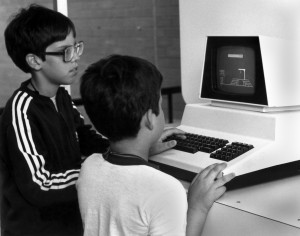Exeunt Yoyogi
Just a short update today, from the UK. The demographic and societal changes in Japan are also affecting the private educational sector. Here’s an article explaining what’s happening to Yoyogi Seminar (hint: they’ll be closing their Sendai branch).
I wonder if this has any implications for English schools?
Humans Need Not Apply
The end of work… and not in a good way
So I’ve been banging on about this for months now, but someone has made a very watchable video about it. Take a look and then think about the future.
Pretty chilling stuff, eh.
Everyone is weird
Some are weirder than others
This article (thanks Ryan) made a lot of sense to me. It’s basically talking about how incredibly successful self-taught people (like Mr. Gates, who is currently trying to remake education in his own image) may have a view of the world that is skewed towards their own experiences and abilities.
I often find something similar in my teaching. I love reading and don’t enjoy deliberate study, so I often encourage my students to do the same. Invariably some of them don’t enjoy reading and do enjoy studying, and a few enjoy neither of those activities.
I think it’s important for teachers to keep this in mind: we are not the same as our students, and their preferences are likely not the same as ours either. It’s easy to forget, but something I keep coming back to.
curriculum high school junior high school op-ed technology
by sendaiben
16 comments
IT education in Japan
I was talking to teachers at a school this week and went on a bit of a rant about how Japanese junior and senior high school students don’t do enough to acquire useful computer skills in school.
During a conversation afterwards, there seems to be an impression among teachers that IT skills involve using tablets, e-textbooks, and other new-fangled resources that they don’t understand.
That was not in the slightest what I was referring to.
I believe all students should acquire the following skills and competencies at school:
- Familiarity with computers, keyboards, mice
- Ability to do basic operations (turn on and off, launch programs, find things on the computer)
- Basic touch typing
- Use of word processors, spreadsheets, presentation software
- Ability to do basic research on the internet
- Ability to share data and collaborate online (via email or the cloud)
- Basic use of email (including spam awareness)
- Basic web design (elementary HTML) and blog creation
- Awareness of online safety issues (including identity theft)
Students should not only do this in their IT classes, but also practice and reinforce these skills in their other subject classes so that they come to see them as tools rather than content for a specific class.
This may seem basic and obvious to some readers, but as far as I can tell is not happening consistently across the board in Japan.
What do you think? Is anything missing from the list?
VUS TESOL 2014 resources and postmortem
I was delighted to deliver the opening plenary for VUS TESOL in Ho Chi Minh City last weekend.
The conference was held at the City Conference Hall and was very well-attended.
I had to be there at 7:00 to set up before the opening ceremony at 8:00. The hall was incredible, it felt a bit like a rock concert with the two tiers of seats and the spotlights.
I started a bit late so had to trim my talk a little on the fly (ended up talking for about 40 minutes instead of the planned 60).
You can see the video of the speech below. My slides are here: 140719 VUS plenary slides, and the notes for the talk are here: VUS TESOL 2014 summary
Overall I wasn’t completely happy with my performance. Giving a plenary is very different from a workshop or presentation, and this was my first one of this scale. I felt I was a bit rushed and had too much content, which means that I wasn’t able to fully develop some of the main ideas.
Still, it wasn’t completely horrible. I would probably give myself six or seven out of ten, and try to do better next time.
I’d like to thank everyone who came to the conference, and especially everyone who came and talked to me. It was great to meet you all.



![IMG_4240[1]](https://sendaiben.org/wp-content/uploads/2014/07/IMG_42401-e1406099549830-300x225.jpg)
![IMG_4239[1]](https://sendaiben.org/wp-content/uploads/2014/07/IMG_42391-e1406099647407-300x225.jpg)